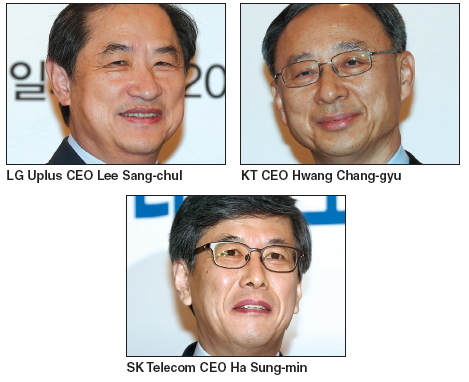Korea will be celebrating the 30th anniversary of the launch of the country’s mobile telecommunications service this week.
Asia’s fourth-largest economy has come a long way to establish itself as the country with the world’s fastest Internet connection speed and highest number of smartphone users.
It was able to adopt newer communication technology faster than other economies, moving from code division multiple access 3G to 4G Long Term Evolution.
The country and its telecom service providers are currently rapidly seeking to commercialize 5G, which experts say would be 1,000 times faster than 4G. LTE-A is often compared to the speed of an airplane and 4G to that of an automobile.
But Korea’s mobile carriers, especially SK Telecom, may need to keep a low profile during the 30th anniversary celebrations as they seem to be experiencing Murphy’s Law, having been mired in trouble lately.

On March 20, marketing executives of SK Telecom, KT and LG Uplus bowed to the public for causing market disorder by giving excessive and unfair subsidies beyond the regulatory limits.
They were regretful. However, some said their stance did not seem to reflect on a joint roadmap they issued as their self-corrective measures lacked concrete details following the government’s disciplinary actions.
On the same day, SK Telecom suffered a network glitch, affecting some 5.6 million users.
KT, the country’s second-largest mobile carrier, has been oblivious to massive subscriber data leaks, further putting itself in a tight spot.
LG Uplus was embroiled in a subsidy war, specifically against SK Telecom, which only made regulators step in and tame their wrongdoings with fines and business suspensions.
Furthermore, Korea Mobile Internet is still finding it hard to become the country’s fourth telecom service provider due to financing issues.
“Adopting faster communication technology may be the only thing worth highlighting for the anniversary,” said an industry source.
Who’s going to be the winner?
As KT CEO Hwang Chang-gyu and SKT CEO Ha Sung-min offered an apology for causing concerns over data theft and network failure, LG Uplus CEO Lee Sang-chul could turn out to be the winner, another source in the mobile sector said.
Even though LG Uplus has also been caught up in the latest subsidy controversy, the third-largest telecom company came out of the doldrums thanks to its openness and fast decision-making.
“SK Telecom may have lost a few market shares, but it will maintain its top position as long as a big accident (like the recent network failure) does not happen again,” the source said.
“Above all, it will be a matter of time before LG Uplus edges out KT and becomes No. 2.”
SK Telecom, which is facing a business suspension from April 5 to May 19, is said to be on the brink of losing a 50 percent market share since customers’ complaints piled up following the network failure and belated response.
SK Telecom and its affiliate SK Broadband, which recently suffered from a customer data theft, were criticized for their careless management of such sensitive information.
The number of subscribers using mobile gadgets with LTE networks exceeded 30 million in February this year, according to the Ministry of Science, ICT and Future Planning.
Korea Mobile Telecommunications Services, which was later acquired by SK Telecom, was the country’s first mobile telecom company, established on March 29, 1984.
By Park Hyong-ki and Kim Young-won
(hkp@heraldcorp.com) (wone0102@heraldcorp.com)







